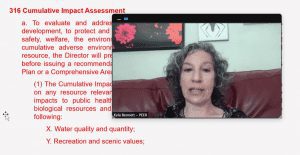 Kyla Bennett, PEER’s Director of Science Policy, testified in front of the Colorado Oil and Gas Commission imploring them to require and oversee a robust analysis of the cumulative impacts of oil and gas development when considering new permits. This is key since currently, wells are being squeezed in among subdivisions without sufficient regard to public health or safety. See the press release from Western Resource Advocates below.
Kyla Bennett, PEER’s Director of Science Policy, testified in front of the Colorado Oil and Gas Commission imploring them to require and oversee a robust analysis of the cumulative impacts of oil and gas development when considering new permits. This is key since currently, wells are being squeezed in among subdivisions without sufficient regard to public health or safety. See the press release from Western Resource Advocates below.
*****
Expert Witness: Rigorous Analysis of Cumulative Impacts of Oil and Gas Development Vital to Adequately Protect Coloradans’ Health, Safety, and Environment
“The state can’t look at each oil and gas operation in a vacuum, but rather must consider impacts from our past actions as well as reasonably foreseeable actions,” said Bennett, Director of Science Policy for Public Employees for Environmental Responsibility, who called on the Commission and Colorado to do the hard work of creating a strong standard. “Looking at cumulative impacts takes some work but is absolutely essential to protecting long-term community and environmental health.”
Bennett’s testimony was part of a historic mission-change rulemaking before the Colorado Oil and Gas Conservation Commission. The hearing is focused on four areas, including cumulative impacts, a central requirement of Senate Bill 19-181, which requires the Commission to better protect public health, safety, and the environment by requiring a cumulative health impact assessment overseen by the agency in addition to considering impacts on climate, lands, water, and wildlife.
This week, the Commission will vote after hearing from staff, nearly 100 parties, and thousands of members of the public who have commented on the rules.
“After a decade spent as a the head of EPA’s Region 1 wetlands enforcement program and reviewing wetland permits under Section 404 of the Clean Water Act, and with the experience of reviewing and commenting on dozens of Environmental Impact Statements prepared under the National Environmental Policy Act, and Environmental Impact Reports and analogous state NEPA laws, I have seen the strength and necessity of a thorough cumulative impact analysis when considering granting new permits. If the COGCC chooses to downplay this essential provision, it is abandoning the legislature’s intent of creating a rule that has the teeth to address air pollution,” said Bennett, calling on the Commission and Colorado to do the hard work of creating a strong standard.
“The Trump administration’s abandonment of rigorous analysis and embrace of ‘alternative facts’ makes this Cumulative Impacts Evaluation process even more vital for Colorado to pursue.”
In her testimony, Bennett urged the Commission “…to ensure that its rules require the necessary analyses to identify and resolve all adverse consequences to Colorado’s resources, whereby cumulative effects are examined over both space and time, and include impacts from
all reasonably foreseeable projects….and to ensure that the COGCC can carry out its mission to protect and avoid and minimize adverse impacts to ecosystem values from oil and gas operations.”
She pointed out the necessity for considering, “cumulative adverse consequences for wildlife and biological resources, water, soils and the environment”… and determining “whether conditions are necessary to avoid and minimize adverse cumulative impacts, and concludes if the COGCC has ultimately protected public health and the environment.”
She reiterated that “it is important for COGCC to have an expansive view of cumulative impacts, and for its regulations to specifically lay out impacts that will be considered from past actions, the projects currently being assessed, and reasonably foreseeable actions.”
Bennett’s full testimony is available here.
WRA and other advocates participating in the COGCC hearing are focused on making the case for draft rules to protect public health, safety, and the environment by requiring a strong cumulative impact analysis as well as the following areas of the rulemaking process:
Local Governments – A critical component of SB 181 allows local governments to adopt stronger regulations than the minimum statewide standards provided by the COGCC. The Commission should uphold the integrity of the law by applying the newly drafted rules statewide, and ensure all Coloradans are guaranteed the same baseline protection.
Setbacks – The Commission should adopt a stronger residential setback rule, which as proposed is both arbitrary and inadequate to protect public health and safety. This is particularly true when schools are provided a more protective setback. The CDPHE has studied the health impacts of living in close proximity to oil and gas development. This science should be presented to the Commission to ensure their votes are informed by this taxpayer funded science.
##